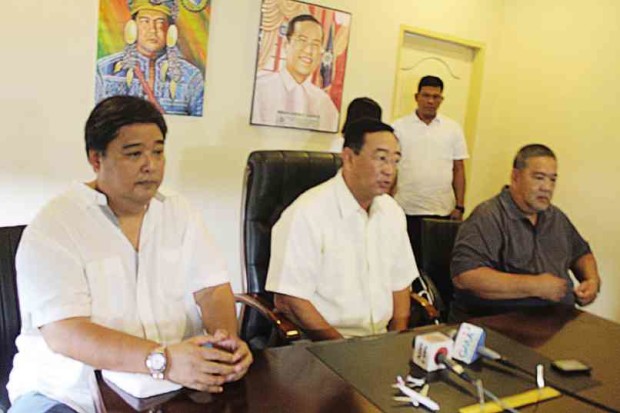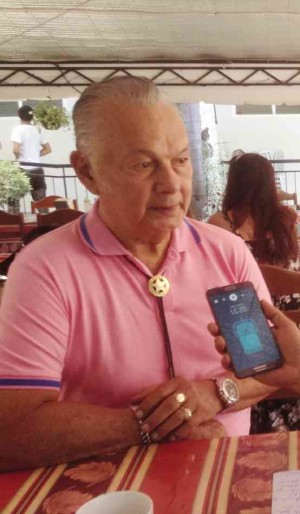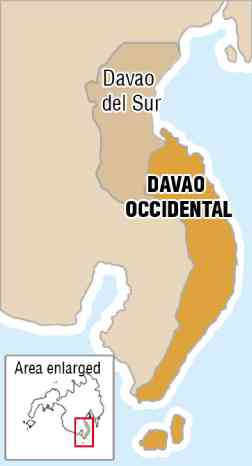All in the family for Davao Occidental

POLITICIAN-BROTHERS The Bautista brothers (from left): Claude, Franklin and Benjamin Joseph. ORLANDO DINOY / INQUIRER MINDANAO
DIGOS CITY—When it became clear that members of the Bautista clan were running unopposed for the major political positions they were seeking in the newly created province of Davao Occidental, lawyer Randolph Parcasio said he was not surprised.
“They have the money, they have an extensive political machinery and they have goons,” Parcasio told the Inquirer in a phone interview.
He said no one in his right mind would run against the Bautistas, even if that person had the resources.
Davao del Sur Gov. Claude Bautista is the lone gubernatorial candidate in the first ever elections in the new province. His running mate is his older brother Franklin, incumbent Davao del Sur second district representative.
The new province was created in 2013 by subdividing Davao del Sur.
Older sister Lorna Bandigan wants to represent the lone congressional district of the new province.
Claude’s other brother, incumbent Malita Mayor Joseph Benjamin, is the vice mayoral candidate of his nephew, Bradley.
“They control Malita, the Davao Occidental town with the largest number of voters. So where does that leave you?” Parcasio asked rhetorically.

MAYOR John Harvey Johnson of Don Marcelino town explains why no political clan has fielded candidates to challenge the Bautistas in Davao Occidental. ELDIE AGUIRRE/INQUIRER MINDANAO
Malita is the capital of the new province and has a voting population of 72,891 in 2010, according to the Philippine Statistics Authority (PSA).
Jose Abad Santos, the second largest town in terms of population, has only 33,977 registered voters, says PSA. Other towns are Santa Maria, 29,097 voters; Don Marcelino, 21,464; and Sarangani, 14,031.
Lost essence of democracy
Professor John Bañas of the University of Mindanao campus here said that with no other contenders for the positions Bautista family members were seeking, the essence of democracy was lost for lack of choices.
Bañas said the situation must have resulted from the fact that the Bautistas had been politicians for a very long time, “decades, in fact.”
They had also built a strong political support among the people.
The Bautista patriarch, the late Benjamin Sr., was a long-serving mayor of Malita in the 1960s. He was also an assemblyman from 1978 to 1984 and was the representative of Davao del Sur’s second district from 1987 to 1998.
Bañas found it interesting that in Davao Occidental, none of the other major political families were running against the Bautistas in the May elections.
Don Marcelino has been controlled by the Johnson family for a very long-time, while in Jose Abad Santos, the Joyce family is in charge. Both families belong to landed clans in the new province and are also quite influential.
“Maybe it’s because the Bautistas have deeply rooted political influence over the people of the province,” Bañas says. “Maybe they (the other families) are afraid to challenge the Bautistas [because] they are [wealthy].
 “Elections are an investment. It’s like gambling. You won’t gamble if you know you have no chance of winning,” he added.
“Elections are an investment. It’s like gambling. You won’t gamble if you know you have no chance of winning,” he added.
Parcasio said he knew too well what it was like running against the Bautistas. In 2013, he ran and lost badly to Franklin for the congressional position.
He agreed with Bañas that a person had to have political influence, money and other resources to challenge the Bautistas for positions in the province, as many voters were impoverished and illiterate.
“I don’t have those (resources), which is why I am not running anymore,” Parcasio added.
Alliance for betterment
Don Marcelino Mayor John Harvey Johnson said what was happening in Davao Occidental was an alliance among influential clans for the betterment of the people.
“We trust the Bautistas to run the affairs of the province, which is why nobody challenged them. Of course, there are many other big families in Davao Occidental but we have decided to let them (Bautistas) run unopposed. We are satisfied with the way they handle politics and the way they perform their jobs so why should we challenge them?” Johnson said.
The mayor disagreed that the Bautistas had “control” over Davao Occidental.
“Even if you are the most influential politician but you do not do your job, nobody would vote you into office. The fact that people continue supporting them shows that they do not neglect their jobs,” Johnson said.
Benjamin Joseph told the Inquirer that the family was thankful to their allies for leaving them unopposed.
“They know we can handle our jobs well,” he said, denying that they had goons.
“No one was prevented from running and there are many politically influential families, which could have fielded bets against us. I believe they trusted us, too, because they let us run unopposed,” Claude said. He also denied that the family had goons, adding they even had to request the police and military for security people.
Claude said the Bautistas had the advantage of having allies or family members occupying major posts in Davao Occidental because support for one another was automatically there.
Built-in support
“For example, I plan to start many big ticket projects. I will need the concurrence of the provincial board, the support of the congressman and local officials. Under the existing situation, I do not think it will be difficult to achieve that goal,” he said.
Bautista said that among the big ticket projects he had in mind were a shipyard, development of agricultural plantations and other ventures that were proven to be economic drivers.
“I am also planning to put up an ecozone to boost the economy, along with more infrastructure projects,” he said.
Claude said that what he did in Davao del Sur would be replicated in Davao Occidental. He would pursue more development projects to bring progress and economic opportunities to the new province’s nearly 300,000 people.
Data on poverty incidence in Davao Occidental are not available, but based on the PSA’s 2012 figure, the per capita poverty threshold in the entire Davao del Sur was P9,639, while the poverty rate was 22.3 percent.
Like its mother province, Davao Occidental’s economy is based on agriculture and fisheries.














